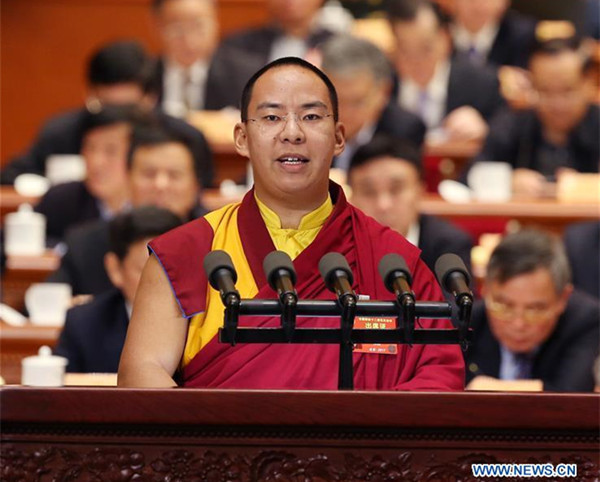
The 11th Panchen Lama Bainqen Erdini Qoigyijabu, a member of the 12th National Committee of the Chinese People's Political Consultative Conference (CPPCC), delivers a speech at the fourth plenary meeting of the fifth session of the 12th CPPCC National Committee in the Great Hall of the People in Beijing, capital of China, March 11, 2017. (Xinhua/Yao Dawei)
Chinese political advisors gathered Saturday to pool wisdom for religious belief, cross-Strait relations, food safety, financial governance, judicial reform and united front work, among other topics.[Special Coverage]
Fourteen members of the Chinese People's Political Consultative Conference (CPPCC) National Committee addressed a plenary meeting at the Great Hall of the People.
Yu Zhengsheng, a member of the Standing Committee of the Political Bureau of the Communist Party of China Central Committee and chairman of the CPPCC National Committee, attended the plenary meeting.
During the meeting, the 11th Panchen Lama Bainqen Erdini Qoigyijabu lamented that some Buddhist temples and monks are eroded by commercialization and called on followers to behave correctly.
The Panchen Lama said that with commercialization, some monks went after money and power instead of guarding Buddhist ethics or concentrating on Buddhist pursuits.8 The 27-year-old senior monk, also vice president of the Buddhist Association of China, said though such incidents and people were not the mainstream, they had left an "extremely bad" influence.
The Panchen Lama said he was concerned about insufficient efforts in nurturing talent as some temples had monks but no instructors, Buddhist scripts but no teaching. Preaching is impossible without a good team of Buddhist instructors.
To keep pace with the needs of the time, Buddhist doctrines should be interpreted in ways compatible to the country's reality and social progress, so that the religion can play its positive role to advance social and economic developments, he said.
The Panchen Lama said he felt "a mission of our time" -- that is to be patriotic, to love religion, and contribute efforts to the Chinese nation's rejuvenation and the well-being of humankind.
Jiang Liping, on behalf of the Central Committee of the Taiwan Democratic Self-Government League, called on Taiwan authorities to acknowledge the 1992 Consensus and conduct consultation and cooperation with the Chinese mainland under the one-China framework.
Jiang said that the Chinese people take a clear-cut and unwavering stand when it comes to major issues concerning national reunification and lasting development. "There will not be any compromise or sway."
The league is one of the eight non-Communist parties in the Chinese mainland. It consists of Taiwan natives living in the mainland and was founded in 1947. It has more than 2,700 registered members.
Jiang praised the Chinese mainland's favorable policies, which have helped Taiwanese youth in studying and accomplishing better development in the mainland. However, cross-Strait youth exchanges have been impaired since Taiwan's Democratic Progressive Party administration refused to recognize the 1992 Consensus.
Gao Youdong called for efforts to improve intellectual property protection through better legislation and create a credit system under which infringement acts will be recorded.
Cai Dafeng said the government should further disclose information in accordance with the law and improve the integrity management system so as to boost government credibility.
Liu Xiaozhuang proposed carrying out comprehensive census on agriculture-related water and soil pollution and reducing pollution by the use of advanced technology.
Liu also urged more efforts to revise the law on the safety of agricultural products so as to ensure food safety.
Wang Dongsheng advised that China participate in global financial governance in a higher level and help boost global financial reform.
Wang also noted that China can contribute its wisdom to building an innovative, mutually beneficial, shared and inclusive international financial order.


















































